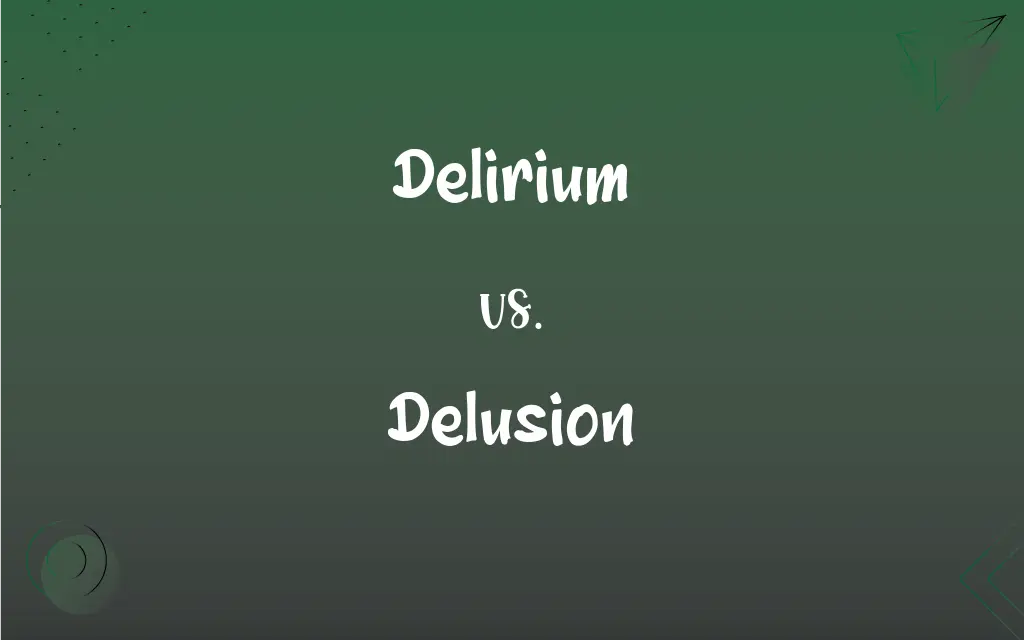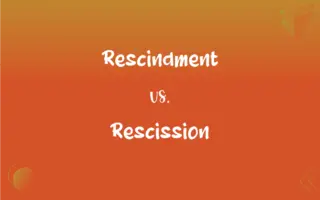Delirium vs. Delusion: What's the Difference?
Edited by Aimie Carlson || By Harlon Moss || Updated on November 3, 2023
Delirium is a confused, disoriented state; delusion is a firm belief contrary to reality.

Key Differences
Delirium is an acute, often fluctuating state of confusion characterized by diminished awareness and cognitive impairments. It typically involves a rapid onset and can result from various medical conditions, drug intoxication, or withdrawal. Delusion, on the other hand, is a false belief strongly held in spite of clear evidence to the contrary, often associated with mental health disorders like schizophrenia.
Delirium is noted for its disturbances in consciousness and attention. Patients may have trouble focusing, sustaining, or shifting attention. Delusions are not an essential feature of delirium, although they may occur as part of the confused state. Conversely, delusions are marked by their persistence and the conviction with which they are held, regardless of the individual's level of consciousness or attention.
In delirium, the cognitive issues extend to memory, orientation, language, perception, and visuospatial abilities, contributing to a potential misinterpretation of reality. While delusions are also misinterpretations of reality, they are specific, often unshakable beliefs that persist over time and are not necessarily associated with cognitive deficits in other areas.
Treatment for delirium involves addressing the underlying cause and managing the confusion and agitation. For delusions, treatment often includes psychotherapy and antipsychotic medications. The approach to delirium is typically more urgent due to its association with acute illness, whereas the management of delusions is often part of a longer-term psychiatric treatment plan.
Delirium can be reversed if the cause is identified and treated effectively, whereas delusions may be more resistant to treatment, especially in chronic psychiatric conditions. The distinction is essential for healthcare providers as it affects the diagnosis, treatment, and the management strategies employed for the patient's benefit.
ADVERTISEMENT
Comparison Chart
Definition
A temporary, often sudden change in mental function marked by confusion.
A false belief held despite evidence to the contrary.
Symptom Onset
Rapid, often within hours or days.
Can develop slowly, often persistent.
Associated Conditions
Infections, substance withdrawal, metabolic imbalances.
Schizophrenia, bipolar disorder, major depression.
Consciousness Level
Altered or reduced awareness of the environment.
Consciousness not necessarily impaired.
Perception
Possible hallucinations, misinterpretations.
Misbelief that is specific, not necessarily perceptual.
ADVERTISEMENT
Cognitive Function
Global cognitive impairment.
May have focused cognitive distortion with intact general cognition.
Reversibility
Often reversible with treatment of the underlying cause.
Delusions are often more persistent, sometimes irreversible.
Delirium and Delusion Definitions
Delirium
Acute Confusion.
The patient's delirium was characterized by acute confusion and disorientation in the ICU.
Delusion
Misconception.
Despite evidence, her delusion that she could fly persisted.
Delirium
Disordered Thinking.
Delirium involves disordered thinking, making it difficult for the patient to remember his address.
Delusion
False Belief.
His delusion of being followed made him change his route every day.
Delirium
Mental Disturbance.
Following surgery, the elderly man experienced delirium, a common mental disturbance due to anesthesia.
Delusion
Fixed Belief.
No matter the argument, his delusion that the TV spoke to him remained fixed.
Delirium
Reduced Awareness.
High fever led to delirium, reducing the patient's awareness of her surroundings.
Delusion
Psychotic Symptom.
The delusion that he was the president was a persistent psychotic symptom.
Delirium
Cognitive Impairment.
Delirium is a severe cognitive impairment that can occur with urinary tract infections in the elderly.
Delusion
Irrational Belief.
The patient’s delusion about the doctor’s conspiracy grew stronger each day.
Delirium
A temporary state of mental confusion and fluctuating consciousness resulting from high fever, intoxication, shock, or other causes. It is characterized by anxiety, disorientation, hallucinations, delusions, and incoherent speech.
Delusion
The act or process of deluding.
Delirium
A state of uncontrolled excitement or emotion
Sports fans in delirium after their team's victory.
Delusion
The state of being deluded.
FAQs
What causes delirium?
Causes include infections, medications, substance withdrawal, and acute illness.
Is delirium the same as dementia?
No, delirium is typically a temporary condition, while dementia is a chronic decline in cognitive function.
Can delirium be treated?
Yes, treating the underlying cause often resolves delirium.
How is delirium diagnosed?
Through clinical assessment including patient history, physical exams, and sometimes imaging tests.
Are hallucinations part of delirium?
Yes, patients with delirium may experience visual or auditory hallucinations.
What are common types of delusions?
Paranoid, grandiose, and somatic delusions are among the common types.
Can delusions change over time?
Yes, the content of delusions can change, especially without treatment.
What is delirium?
Delirium is a rapid onset of confusion resulting from disruptions to normal brain activity.
Do delusions affect memory?
Delusions don’t directly affect memory, but they may coexist with memory impairments in psychiatric conditions.
Can delusions be a symptom of other conditions?
Yes, they can occur in schizophrenia, bipolar disorder, and major depressive disorder with psychotic features.
Are delusions always bizarre?
Not always; some can be quite plausible, which can make them harder to recognize.
Can delusions occur without mental illness?
Yes, delusions can sometimes occur in the absence of a diagnosed mental illness, due to extreme stress or isolation.
What is a delusion?
A delusion is a strongly held false belief that is resistant to reason or contradictory evidence.
Is a delusion a conscious choice?
No, individuals with delusions genuinely believe in their false perceptions.
Can stress cause delirium?
Stress can exacerbate the risk, but it is not a direct cause of delirium.
Can children experience delirium?
Yes, children can experience delirium, often due to high fevers or medications.
Is delirium an emergency?
It can be, especially if it's severe and the underlying cause needs urgent treatment.
Can people with delirium recognize their condition?
Recognition varies; some may have insight, while others may not be aware of their confusion.
Can delusions be harmful?
Yes, especially if they lead to risky behaviors or affect social interactions.
Are delusions treatable?
Yes, with appropriate psychiatric treatment including medication and therapy.
About Author
Written by
Harlon MossHarlon is a seasoned quality moderator and accomplished content writer for Difference Wiki. An alumnus of the prestigious University of California, he earned his degree in Computer Science. Leveraging his academic background, Harlon brings a meticulous and informed perspective to his work, ensuring content accuracy and excellence.
Edited by
Aimie CarlsonAimie Carlson, holding a master's degree in English literature, is a fervent English language enthusiast. She lends her writing talents to Difference Wiki, a prominent website that specializes in comparisons, offering readers insightful analyses that both captivate and inform.































































